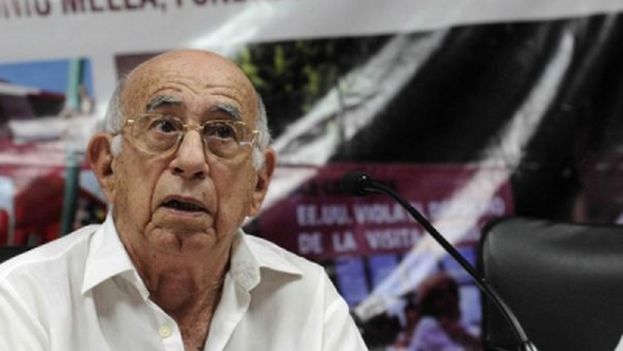
![]() 14ymedio, Reinaldo Escobar, Havana, 27 March 2017 — Just a month ago his face disappeared from the Cuban government’s family photo. The last time he was seen, Vice President José Ramón Machado Ventura handed out orders in an extensive agricultural area of Pinar del Río. Four weeks later, no official media has offered an explanation for the absence of the second most powerful man on the island.
14ymedio, Reinaldo Escobar, Havana, 27 March 2017 — Just a month ago his face disappeared from the Cuban government’s family photo. The last time he was seen, Vice President José Ramón Machado Ventura handed out orders in an extensive agricultural area of Pinar del Río. Four weeks later, no official media has offered an explanation for the absence of the second most powerful man on the island.
Now 86, this man born in Villa Clara’s San Antonio de las Vueltas, has stood behind Raul Castro for more than five years, in his position as the second secretary of the Cuban Communist Party (PCC), which the Constitution of the Republic consecrates as the “the highest leading force of society and the State.”
The man who was never absent from our television screens and newspaper pages for more than 48 hours has failed to appear since 27 February. An absence that feeds rumors among a people accustomed to giving more importance to a lack of news than to the news itself. But above all, it is a disappearance that comes at a bad time for the Plaza of the Revolution.
It is less than a year before Raúl Castro leaves his office as president and every day the uncertainty of who will relieve him in his post increases. Machado Ventura’s departure from the game would force the hurried naming of a second secretary of the PCC and put a face to one of the most jealously guarded mysteries of recent years.
The next few weeks could be of momentous importance for clearing up this question
The next few weeks could be of momentous importance for clearing up this question. If the first vice-president, Miguel Díaz-Canel, assumes the second position in the Party it will prolong the tradition of concentrating in a single person the highest positions in the country. To choose among other names, such as Bruno Rodríguez, Lázaro Expósito or Salvador Valdés Mesa, could open a bicephalic route, unprecedented in communist regimes.
For decades, all power was concentrated in Fidel Castro, who placed his brother in the rearguard of his countless positions. In 2006, already with serious health problems, the Maximum Leader had to step away from public life and Raúl Castro inherited that conglomerate of faculties that placed him at the head of the Party and the State.
Nevertheless, during the Raul era “second positions” have bifurcated. The first vice-president is no longer the same person as the second secretary of the PPC, among other reasons so that no one person could completely replace the General-President. A measure of protection, but also an evidence of the lack of confidence of the historical generation in its relief team.
In this new structure, Machado Ventura remained second in the Party. Machadito, as his friends call him, has cultivated a public image as the ayatollah and custodian of ideological purity. An orthodoxy that in the Cuban case does not cling to the dogmas of Marxism-Leninism but to the voluntarist* doctrine of Fidelismo.
Machado Ventura earned his reputation for immobility through prohibitions and punishments
Analysts blame this iron-fisted goalkeeper’s presence at the top of the pyramid on Fidel Castro’s express wish, placing him behind his brother to prevent the latter from veering from the path. This is how a man who once qualified in medicine became, according to Soviet terminology in the times of perestroika, the “braking mechanism” on the reforms Raul Castro might have pushed.
Machado Ventura earned his reputation for immobility through prohibitions and punishments. He was in charge of leading the provincial assemblies prior to the last Communist Party Congresses, confabs where the principle agreements were hatched, the delegates chosen and where the key points of the Party Guidelines that today are the “sacred commandments” of Raulismo were committed to.
However, that role seems to have come to its end. The man who ordered the dismissal of high-level cadres and for decades banned Christmas trees in public establishments has left the scene. Missing with him are his harangues calling for efficiency and his visits to workplaces where he advocated greater discipline and sacrifice.
It remains possible that Machadito – the guardian of orthodoxy – will reappear at any moment like the phoenix, and leap between the furrows to explain to farmers how to plant sweet potatoes or arrive to instruct the engineers of some industry how to make better use of their resources. The followers of the hard line would receive that return with relief.
Translator’s note: Voluntarism is the view that revolutionaries can change society by means of will, irrespective of economic conditions. Source: David Priestland, Stalinism and the Politics of Mobilization. (Or, in another and quite a bit older formulation…)
